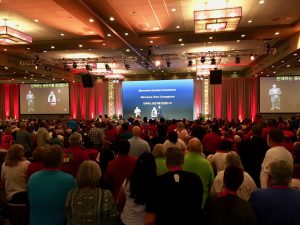HOMILY WEEKDAY 15 05 – Year II
Love over Law; Compassion over Compunction
(Is 38:1-22:8; Is 38; Mt 12:1-8)
******************************************************
“I desire mercy, not sacrifice.”
That simple statement of Jesus in the gospel today invites us into deeper faith in him as God among us, and into a deeper understanding of what it means to believe in him and live out his teachings of the primacy of love over law, mercy over sacrifice.
To better understand this gospel conflict with the Pharisees, we need a little background from the prophet Isaiah, who at one point prophesied both that God will shepherd God’s own people, and, God will send someone who will shepherd God’s people with justice and compassion. Isaiah leaves us with a question – which will it be? The answer is both.
In King David, whom Jesus references in the gospel, we see part of the answer – a human shepherd in action. King David was the truest representative of God on earth for the people, once he repented and experienced God’s unconditional love as forgiveness. Aware he was appointed by God and God’s representative on earth, King David was able to supersede the law regarding the bread of the Presence only the priests could lawfully eat, and give it to his men who were hungry. What was happening in that incident was King David basically doing what he knew God would do if God were in that situation. That is true King energy – David was being compassionate to his men, shepherding them as God would have, going by the law of love instead of a lesser law regarding the bread of the Presence.
In the gospel, Jesus is criticized by the Pharisees for breaking the Sabbath law and allowing his disciples to break off and eat ears of corn. The setting is very similar to that facing David in the Old Testament. What is different here is the two prophecies of Isaiah coming together – Jesus is both Son of God, or God shepherding God’s people, and Son of Man, or a human being sent to shepherd God’s people.
Jesus goes on to claim he is greater than the Temple, which was the dwelling place of God on earth, in the Holy of Holies where the ark of the covenant and the bread of the Presence were kept. In short, a claim to his divinity. As well, elsewhere in the gospels, Jesus claims to be greater than the Torah, which was the ultimate authority for the Jewish religious leadership. “You have heard it said, ‘Eye for eye and tooth for tooth, but I tell you…” Again, a claim to his divinity.
The message is clear – Jesus is the Messiah, the Son of God and the Son of Man, sent by the Father to shepherd God’s people. He would bring the fullness of life, eternal life, and God’s love, mercy and compassion to a people who were like sheep without a shepherd.
The response of the Pharisees should have been faith in Jesus, and wholehearted acceptance of him and his teaching of the primacy of love for God’s people. It was a message of love, mercy and compassion, rather than of law, sacrifice and compunction.
The Pharisees failed to respond to Jesus, caught up as they were in their own self-made system of religious collaboration with the Romans and their addiction to possessions, prestige and power. Our response can, indeed must be different – we can place our complete and total faith in Jesus as both God and human – the Word made flesh, Risen Lord and Saviour, and live his teachings of love, mercy and compassion, helping to build up the reign of God here on earth.

WWME Convention opening
I find a wonderful response to this message of Jesus to put mercy, love and compassion first in our lives is the Worldwide Marriage Encounter movement, which celebrated its 50th anniversary at a convention in Lombard, Illinois in July 2018. Six hundred and fifty couples, around ninety priests and five bishops gathered to mark the occasion which was live-streamed around the world. It is hard to measure the impact this movement has had on innumerable relationships and religious vocations over those fifty years. The selfless love, sacrifice and caring for our God, the Church and the well-being of couples, priests and religious manifested by this movement and the weekends at the heart of the movement is a much-needed source of hope and healing for both the church and the world.
The Eucharist is our Bread of the Presence – the Real Presence of Jesus Christ, our Lord and Savior, Son of Man and Son of God, who came to truly shepherd God’s people. May our celebration strengthen our faith in Jesus, and empower us to live out his teachings of love, mercy and compassion over law, sacrifice and duty.



